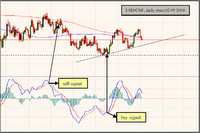
The Indian stock market is a classic example of what happens when speculation reaches its boiling point. After reaching an all-time high in May 2006, Bombay Stock Exchange's Sensex Index has fallen close to 30% in a month.
Neither the market nor the future can be predicted or controlled by the speculator, yet success is largely dependent upon them both.
To help make sense of the seemingly random behaviour of the stock market in the short-term, the speculator uses Technical Analysis. Technical Analysis gives a speculator the tools to "analyze" and "predict" the stock market - usually using trend lines, moving averages and other sophisticated statistical indicators.
Technical Analysis is popular with speculators because it is meant for people who want to make fast money. Unfortunately, like all things that are too good to be true, it does not work for the average person. But the lure of fast money (and a bull market!) is too strong for most to give up Technical Analysis.
 Since mathematics and statistics is used in Technical Analysis, it appears as if the actions of the speculator are legitimate - after all, mathematics can't be wrong! Besides, what is wrong with using Technical Analysis to help you decide when to buy, when to hold and when to sell?
Since mathematics and statistics is used in Technical Analysis, it appears as if the actions of the speculator are legitimate - after all, mathematics can't be wrong! Besides, what is wrong with using Technical Analysis to help you decide when to buy, when to hold and when to sell?People also talk about meaningless "support levels" for individual stocks and market indices, below which all hell can break loose. Support levels, trend lines etc. are akin to lines on our palm that supposedly tell our future! These are all very interesting things but not very useful if one wants to make money in the stock market over the long-term (10 years or more).
There are a few fundamental problems with Technical Analysis that need to be brought to people's attention:
1. The speculator has no margin of safety. Since a proper margin of safety is lacking, the risk taken is often too high.
In Technical Analysis, there is no such thing as buying "undervalued" or "underpriced" securities. Technical indicators generate 'buy' and 'sell' signals. In a significant number of cases, a 'buy' signal is not generated until after a significant rise in the stock price - thus, a speculator misses some truly "golden opportunities". The idea is that a speculator is willing to give up some upside in return for little or no downside.
Speculators are in the market to make fast money. Generally speaking, speculators do not buy shares based on the company fundamentals (like profitability, debt load, book value etc.) or valuation, they instead buy shares based on technical indicators.
This means that the price paid is irrelevant as long as the technicals are good. For this reason alone Technical Analysis is dangerous because one could end up buying when the market is overheated.
2. Technical Analysis is an art/skill, rather than a science.
It cannot be learned from a book. Either you have the skill and intuition to be a successful technical analyst, or you don't. Being "average" at this will not make you rich and may yield disastrous results.
In the long run, most speculators end up making little or no money at all, or worse yet, losing money! In most cases, their few large speculative profits are fully offset by the many small losses.
3. Technical Analysis favours stockbrokers.
Brokerage houses and stockbrokers encourage using technical analysis because it is good for their business. Speculators buying and selling using technical indicators will be doing so often simply because these indicators are generated as the share price rises and falls.
Frequent trades mean more commissions for brokers and lower profits for speculators. Technical Analysis discourages long-term perspective and forces speculators to buy and sell on a weekly and even daily basis.
As a matter of fact, in Canada, the broker charges a "maintenance fee" on an account in which there has been no trading activity in the past twelve months! It's obvious they do not want us to simply buy and hold stocks - which is an intelligent way of building wealth.
Technical Analysis is good if one desires to become a sheep in the stock market - i.e. buying when everyone is buying and selling when everyone is selling. It sure is a great way of obtaining mediocre returns!
So, what should an investor with a long time horizon use to buy stocks? Balance Sheet analysis (i.e. value investing) ofcourse! Read more here.


9 comments:
any one who read a few investing articles and documents has the tendency to write something on technical analysis and trading which he may or may not have digested even 10%.
:-)
read more.. think more and u shall see.
while value hunting is good.
technical patterns also have their own small place in the sun.
I've been in the stock market business for over 5 years now and have tried literally everything.
So this post is from my own personal experience. I have tried using Technical Analysis and know all about Elliot Waves, MACD, "efficient market" theories etc.
From my own personal experience I feel that Technical Analysis is trying to make sense out of random numbers. Not a good idea.
same with fundamental analysis also.
its also as much as an art and financial num change with the wind.
u can find margin of safety..
in trading u have risk management.
having spent 5 years in trading and used macd doesnot means that is what is there in the game.
just my simple views.
I have seen first hand people get taken in by the technical analysis, and the fancy graphs and charts, which mean zilch. The price movements of stocks are definitely random numbers, and predicting these is like predicting the where the ball lands on a roulette table. Better go by company fundamentals and price-value calculations.
Good views,
but how many of the speculators u met know about technical analysis and how many of the investors u met knew abt balance sheets compnay prospects etc n fundamental analysis.
if u say i met 100s of people with experieence in technicals as well as fundamentals n if they say that graphs n all dont work then i doubt it big time.
Majority of the suckers in the markets are punters n betters with no knowledge just guts to loose money.
so if they loose no analysis is the cause for that.
If i have to buy some stock for say 5-10 years i would definitely go with fundamental analysis n balls to technicals.
but if u tell me that i hav a 8-10 mths perspective tell me m i rit in buying this fundamentally then u r a dumbass. coz if fundamentals were a factor in short to medium term prices wud change only on announcements or quarterly results isnt it logically .
Making money is blending the exact balance of technicals n fundamentals above all experience n knowledge.
enjoy!
Nooresh
Nooresh,
I agree with what you're saying.
But the problem is that technical analysis encourages short-term trading and it is very difficult to make money, consistently, in the short-term. Also, the transaction fees are a killer!
I don't think it is necessary to know what Bollinger Bands, MACD, trend lines etc are in order to make money. But isn't it important to know how much debt a company is carrying?
Fundamental analysis (especially balance sheet analysis) is not in fashion these days and those using it definitely have an edge over all others simply because most people are not using it. They therefore, have a better chance of actually beating the market (i.e. beating the average).
If I do what everyone else is doing, how can I expect to be better than millions of people out there who are trying to do the same thing as me? By default, my returns would be average/mediocre.
Stock Market survives on dis-agreement! It is the dis-agreement among traders and investors that gives life to the stock market.
Each and every one who trades/invests in the stock market has right to believe which system is 'right' and which system is 'wrong' in stock selection according to his beliefs and instincts. But he should always remember that there is no best system among all available systems which guarantees profits when compared to other systems.
If there is any stock selection system which is the best, then each and every one in the stock market will follow that system. In that case you will not find buyers if you want to sell and you will not find seller if you want to buy because at any given time all of us would be either want to buy or want to sell according to that system.
In stock market, some people believ fundamental analysis, some people believe technical analysis, some people believe astrology and some people believe numerology. All these systems strongly dis-agree with each other. We have complete freedom to select any system and AT THE SAME TIME WE SHOULD RESPECT OTHERS AND THEIR STOCK SELECTION SYSTEMS for their contribution to the "dis-agreement" factor which gives life to the stock market.
It is because of the dis-agreement factor that we find both buyers and sellers at any price level. In the absence of dis-agreement there will be only buyers or only sellers but not both buyers and sellers.
So, in the absence of dis-agreement there will be no Stock Market at all.
Hence, each and every one is 100% correct in what ever stock selection system he believes.
hello.
A bit from my Grey matter,swing and short term trading TECHNICALS are like God!!,Why few fellow investors or traders for that matter tend to believe in the belief that technicals don't work are because of the whole sole reason that they are bad at money management, When you enter a trade money management is must calculate your risk and reward before getting into trade. I personally feel technicals are 20-30% rest 70 % is all about money management,Stock price move can't be nonchalant they tend to move according to investor,trader psychology,with technicals we try to read human psychology, So if someone says technicals are some imaginary numbers it will be a "naked" lie.
IN THE END MONEY MANAGEMENT IS THE MANTRA
A ELLIOT fan:-)
I agree with Santosh's "disagreement factor" - it's what makes the market. It'a also what allows some to make above-average returns.
So many are using TA these days that the results from using TA has become the "average".
TA may have worked in the past. However, the actions of the millions of people using TA has rendered this technique useless. All chart readers think they can "read" it better than the other person.
In order to get above-average returns in the stock market, you have to do what the average person is NOT doing - that is, use something other than TA.
I'm glad to see that most people are not taking my views in an offensive way (as they are not meant to be) :)
Post a Comment